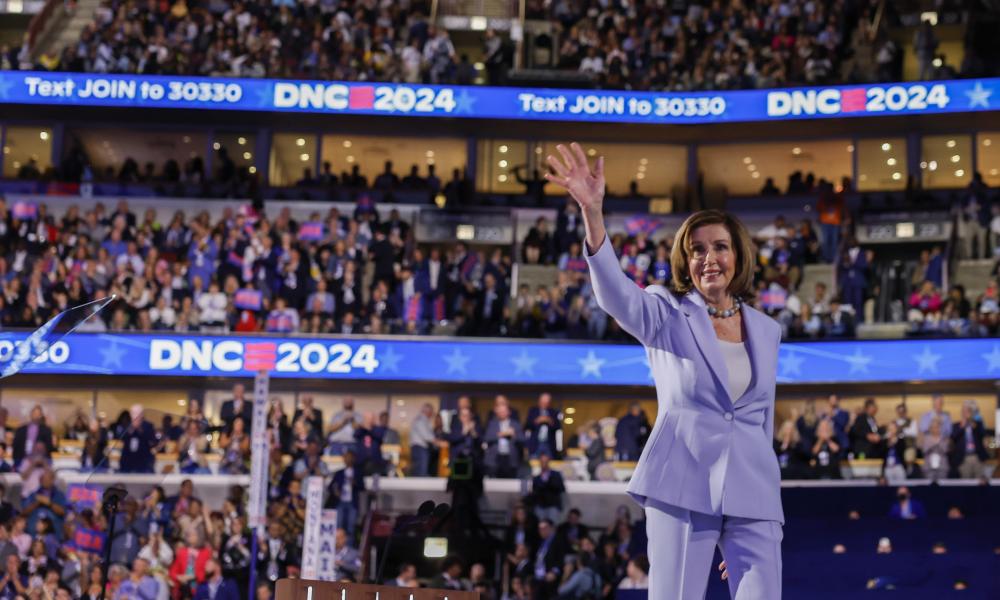Democrats rose to their feet when Nancy Pelosi walked on stage at the United Center in Chicago for the Democratic national convention. They applauded, and then applauded louder. Pelosi waved before quieting the room.
The former House speaker began by expressing her gratitude to Joe Biden, calling his term “one of the most successful presidencies of modern times”. even though she had pushed subtly but forcefully for the president to step aside.
“Thank you, Joe,” she said, before turning to Kamala Harris, a fellow Californian who Pelosi said was “ready to take us to new heights”.
Pelosi may have retired from her speakership, but the convention has proven – if proof were needed – that the veteran congresswoman remains one of the most important power brokers in the party who can make – or break – a US president.
At an event earlier on Wednesday, Pelosi was reluctant to divulge details of her conversation with Biden just over a month ago, during the deeply agonizing period before he decided to abandon his re-election bid and endorse Harris.
Speaking at the University Club of Chicago, in a room paneled with stained glass, Pelosi insisted that the monumental decision was Biden’s alone to make. But pressed by Democratic strategist David Axelrod, she conceded that she believed it “essential” Democrats deny Donald Trump a second term. The cost was denying Biden one, too.
“I wanted very much to protect his legacy,” she said. But her highest priority was to win the election – and not just the White House, but the House and the Senate. “A great sacrifice was made here,” she said.
Pelosi appeared uncomfortable with the suggestion that she played the central role in pushing Biden to end his re-election campaign, a decision that transformed the presidential race. Harris has unified the party behind her and her running mate, Tim Walz, a former Minnesota congressman who Pelosi had also advocated for.
“You have to make the decision to win, and you have to make every decision in favor of winning,” she said.
Biden denied that any one person had pushed him out of the race. Speaking to reporters on Monday, after delivering what amounted to a farewell speech at the Democratic convention, he said: “No one influenced my decision. No one knew it was coming.”
Pelosi and Biden, devout Catholics who have known each other for decades, have not spoken since he ended his campaign. The rupture has weighed on Pelosi, she said. “I’ve cried over this. I’m sad about this,” she said.
During his remarks in Chicago, Biden said: “All this talk about how I’m angry at all those people who said I should step down, it’s not true.”
Pelosi, the daughter of a longtime Baltimore mayor and student of the city’s brass knuckle politics, shared anecdotes from her new book, The Art of Power, about her extraordinary career arc that she described as: “housewife, House member, House Speaker.”
She was the first – and so far only – female speaker of the House, and was the highest ranking woman in US politics until Harris was elected to serve as the nation’s first female vice-president.
“You have to be able to take a punch, you have to be able to throw a punch … for the children,” she said, a Pelosi-ism that drew laughs from the packed audience.
Asked by Axelrod whether Harris should emphasize the history-making possibility of her candidacy, Pelosi said breaking what Hillary Clinton once called the “highest hardest” glass ceiling in US politics was important, but not a political message.
Related: Walz, Bill Clinton and surprise Oprah: Democratic convention day three key takeaways
The prospect of Harris becoming the first woman president “brings tears to my eyes” Pelosi said, but it doesn’t necessarily bring “votes to the ballot box”.
“It’s icing on the cake,” she said. “But it ain’t the cake.”
Now considered one of the most powerful House speakers in modern political history, Pelosi said she faced doubts as she climbed the ranks in Congress from male colleagues who admonished her to wait her turn.
“I became interested in running [for leadership] because we kept losing the elections, 94, 96, 98 and then it was 2000 I thought: ‘I’m so tired of losing,” she said.
When she made her decision to run for Democratic leadership known, Pelosi said she was immediately met with skepticism, especially among her male colleagues.
“Who said she could run?” Pelosi recalled them saying. Their incredulity only encouraged her further.
Pelosi continued, saying she was told there was a “pecking order” and she wasn’t in it.
“They said: ‘These people have been waiting a long time,” Pelosi recounted. “So I said: ‘Was it over 200 years?’”
Democratic convention highlights:


